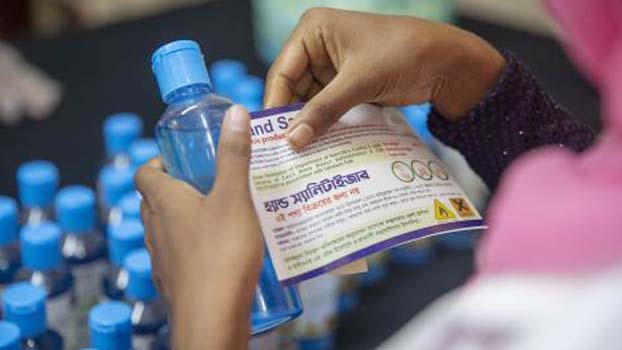IOM to produce 100,000 bottles of hand sanitiser in Cox’s Bazar

International Organization for Migration (IOM) along with collaboration of two local non-government organisations and Cox’s Bazar district administration will produce 100,000 bottles of 200 ml hand sanitizers in Cox’s Bazar.
In a press release, it was said that IOM, with local partners Prottyashi and Green Hope, would produce these. The IOM decided to produce hand sanitizer locally in accordance with World Health Organization (WHO) guidelines while the district administration acquired all necessary permits and permission from the narcotics controls department to procure and transport raw material required to produce 20,000 litres of hand sanitizer, a press release said here today.
IOM, with local partners Prottyashi and Green Hope, will produce the hand sanitizers to equip at least 50,000 local government’s law enforcement and other community personnel who are delivering essential services to the public.
Host Community members were recruited by IOM and partners to support production and will be trained and supervised by professional pharmacists while Quality control, testing and training will be monitored by the IOM Health Unit.
The production of hand sanitizer will help these host community members meet some of their household income needs as many of them have lost their traditional livelihoods due to the COVID-19 lock-down, said the release.
In the days following the first confirmed COVID-19 case in Bangladesh in early March 2020, hand sanitizer and other essential hygiene products became scarce due to rising demand, leading to a sharp price increase in the local markets of Cox’s Bazar, home to the world’s largest refugee camp.
"With this joint response, the District Administration and IOM are continuing to combat COVID-19 collaboratively. The local production of hand sanitizers will prevent transmission of the virus in the District’s communities and improve our hygiene practices,” said Cox’s Bazar’s Deputy Commissioner, Md Kamal Hossain.
Host Community members were recruited by IOM and partners to support production and will be trained and supervised by professional pharmacists. Many of these host community members have lost their traditional livelihoods due to the COVID-19 lock-down and its subsequent economic impact.
The production of hand sanitizer will help them meet some of their household income needs. Quality control, testing and training are monitored by the IOM Health Unit.
Taslima Akter, a beneficiary from Ukhiya supporting the project, said: “It’s my first opportunity to work on such a project. It also my first job, so I am happy that I can support my family financially in this lockdown.”
Patrick Charignon, Head of IOM’s Transition and Recovery Division in Cox’s Bazar said, “This project, jointly initiated with the District Administration and partners, will contribute to IOM’s overall COVID-19 response.
In addition to wearing masks, regular hand washing, and maintaining physical distance, the provision of hand sanitizer to local government, law enforcement and other community personnel aims to disrupt the transmission of the outbreak.”




